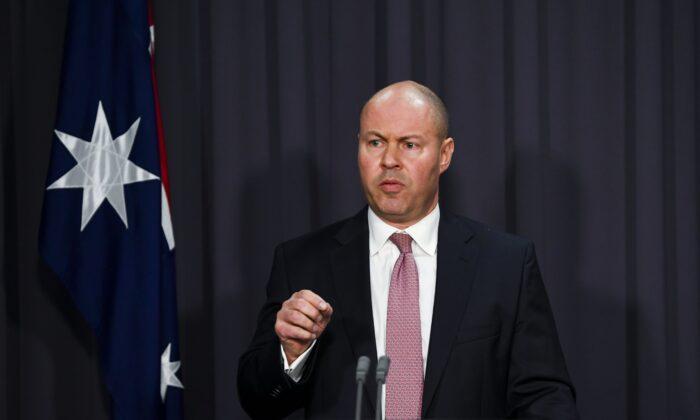“In the budget ... there will be further measures to support families to meet the cost of living pressures, in a targeted and proportionate way,” Frydenberg wrote in an op-ed for News Corp’s The Australian on March 17.
“In the second phase of our fiscal strategy, we will target a budget position that allows us to stabilise and then reduce debt as a share of the economy. This year’s budget will confirm that this is the trajectory we are now on.
“It will show a substantial improvement to the budget bottom line—the product of more Australians in work and fewer Australians on welfare,” he said.
The budget, which will be delivered in the lead up to this year’s federal elections, is expected to reveal a projection where debt compared to the size of the economy will peak lower than earlier thought.Frydenberg said that during the pandemic the ruling Coalition government had driven down electricity prices by eight percent, provided $10 billion in childcare support, and around $30 billion in tax relief for low and middle income earners.

This comes as the unemployment rate fell to levels lower than before the pandemic, at four percent—the equal lowest in 48 years. Treasury had predicted it would not fall lower than six percent until the end of 2023 at the earliest.
But the Labor opposition’s shadow treasurer Jim Chalmers says the federal government cannot be trusted on what it says about the economy.
“This coalition government has barely anything to show for the record debt they had already multiplied even before the pandemic,” he said.
“After a decade of marketing and mismanagement, the dividend for Australians is skyrocketing costs of living, falling real wages, and families falling further behind.”

“A false prophecy. Three months after JobKeeper ended, 120,000 more Australians were in work,” Frydenberg said.
He also pointed out that 373,000 new jobs were created only one month after Labor’s Shadow Finance Minister Katy Gallagher opposed ending pandemic disaster payments, and that despite refusing the state Labor governments’ request for “more broad-based economic support,” that a month later the unemployment rate fell to a 13-year low.Frydenberg warned that Labor may make bad economic decisions in government, citing the left-leaning party’s $80 billion worth of additional spending commitments during the pandemic.
“Once Labor starts spending, they never know how to stop. Crisis level economic support must not become entrenched,” he said





